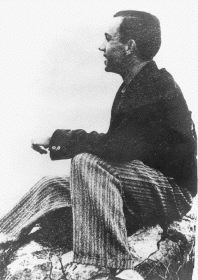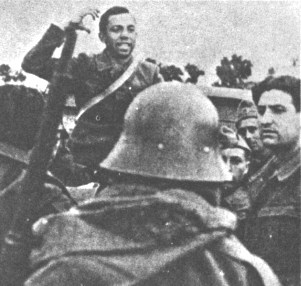Miguel HernŠndez
 Miguel
HernŠndez (1910 - 1942) was born in Orihuela,
Spain, the son of a goat-herder. He had little formal education, yet
learned enough to read and write. He was expected to follow in his
father's footsteps: tilling the soil, tending goats and selling milk from door
to door. But soon he began to write and with the minor success of his
first book, Expert in Moons, he moved to Madrid, where he was befriended
by Neruda, Lorca, Alexandre and other influential writers of the time.
His reputation became firmly established with the publication of his second
book, The Unending Lightning. Shortly after its publication, the Spanish Civil War broke out.
He volunteered and served at the front with the Republican Army's 5th
Regiment. As the Republican cause collapsed,
HernŠndez was taken prisoner by Franco's
forces. He spent the rest of his life in and out of prison, finally dying
in the spring of 1942 from the complications of tuberculosis. His poetry
is noted for its raw passion, emotion, and authenticity. Miguel
HernŠndez (1910 - 1942) was born in Orihuela,
Spain, the son of a goat-herder. He had little formal education, yet
learned enough to read and write. He was expected to follow in his
father's footsteps: tilling the soil, tending goats and selling milk from door
to door. But soon he began to write and with the minor success of his
first book, Expert in Moons, he moved to Madrid, where he was befriended
by Neruda, Lorca, Alexandre and other influential writers of the time.
His reputation became firmly established with the publication of his second
book, The Unending Lightning. Shortly after its publication, the Spanish Civil War broke out.
He volunteered and served at the front with the Republican Army's 5th
Regiment. As the Republican cause collapsed,
HernŠndez was taken prisoner by Franco's
forces. He spent the rest of his life in and out of prison, finally dying
in the spring of 1942 from the complications of tuberculosis. His poetry
is noted for its raw passion, emotion, and authenticity.

From Wind of the People (1937)
Seated on the Dead
Seated on the dead
who have been silent for two months,
I kiss empty shoes
and grasp furiously
the hand of the heart
and the soul that supports it.
That my voice would rise to the mountaintops
and descend to the earth as thunder,
this is what my throat asks for
now and always.
Draw near to my outcry,
people from the same mother,
tree whose roots
hold me imprisoned,
because I am here to love you
and I am here to defend you
with my blood and my mouth
like two faithful rifles.
If I came out of the earth,
if I was born from a womb
with no luck and no money,
it was only so I could become
the nightingale of the misfortunate,
echo of bad luck,
and to sing and repeat
to those who must hear me
all that is pain, all that is poverty,
all that is the earth.
Yesterday the people woke
naked and with nothing to put on,
hungry and with nothing to eat,
today it dawns
deservedly stormy
and deservedly bloody.
In their hands rifles
long to become lions
to finish off the wild animals
who have been animals so many times.
Although you lack weapons,
people of a hundred thousand strengths,
donít let your bones weaken,
punish those who wound you
as long as you have fists,
fingernails, saliva, and you have
heart, entrails, intestines,
testicles and teeth.
Brave as the brave wind,
gentle as the gentle air,
kill those who kill,
hate those who hate
the peace of your heart
and the womb of your women.
Donít let them stab you in the back,
live face to face and die
with your chest pointed to the bullets,
wide as a wall.
I sing with the voice of mourning,
my people, for your heroes:
your desires like mine,
your misfortunes that have
of the same metal and weeping,
your suffering of the same grain,
and the same wood
your thought and my mind,
your heart and my blood,
your pain and my laurels.
Life seems to me
like a barricade of nothingness.
I am here to live
as long as my soul is alive,
and I am here to die,
when my hour comes,
deep in the wellspring of the people
now and always.
Life is a lot of gulps
but death only one.
From Man Ambushes (1939)
First Song
The field
retreated
when it saw man, muscles
tightened, rush forward.
What an abyss appears
between olive tree and man!
The animal who sings:
the animal who can
weep and sink roots,
remembers his claws.
Claws that he adorned
with gentleness and flowers,
but at last laid bare
in all their cruelty.
They crackle in my hands.
Keep away from them, son.
I am ready to plunge them,
ready to thrust them
into your slight flesh.
I have changed back into the tiger.
Keep away or I will destroy you.
Today love is death,
and man ambushes man.
The Soldier And The Snow
December has frozen its double-edged breath,
and snorts heavily from the frozen skies,
like a dried flame unfolding in threads,
like a long ruin that attacks the soldiers.
Snow where the horses have left their hoof prints
is a solitude of mourning that gallops on.
Snow of splintered fingernails, of worn-down claws,
of celestial malice, of absolute scorn.
It bites, fells, pierces like a tremendous axe-blow,
an axe of fierce and pale marble.
It descends, it falls everywhere like an exhausted hug
of precipices and wings, of solitude and snow.
This aggression that splits off from the core of winter,
raw starvation, tired of being hungry and cold,
threatens the naked with an eternal rancor,
white, mortal, starving, silent, and somber.
It longs to appease the forges, the hatreds, the campfires,
it longs to dam up the seas, bury the beloveds:
and it raises slow and diaphanous barriers,
silent statues and glassy attackers.
I want the heart of wool in so many shops
and textile mills to spill over
to cover the bodies that scald the morning
with their shouts, their stares, their feet and their rifles.
Clothes for the bodies that can go naked,
that can be dressed in frost and ice:
lean stone fighting against the rough beaks,
the pale bites and the pale retreats.
Clothes for the bodies that repel
the whitest attacks with the reddest bones.
Because these soldiers have solar bones,
and because they are campfires with footsteps, with eyes.
The coldness rushes forward, death is defoliated,
I listen to the noiseless sounds raining down.
On the white snow, red life and red color
turn the snow steamy, sow fire into the snow.
So resolutely are the soldiers rock crystals
that only fire, only flame crystallizes them,
and they attack with snowy cheekbones, with mouths,
and turn all they attack into memories of ash.
July 18, 1936 - July 18, 1938
It's blood, not hail, that flogs my temples.
Two years of blood: two enormous outpourings.
Blood that acts like the sun, you come devouring
until the balconies are left empty and drowned.
Blood that is the greatest of all riches.
Blood that was hoarding all its gifts for love.
See it stirring up the tides, startling trains,
discouraging bulls as it inspires lions.
Time is blood. Time circulates through my veins.
In the presence of clocks and dawns I am more than wounded,
and I hear the colliding of bloods of all sizes.
Blood where it is barely possible for death to bathe:
a brilliant flowing that hasn't grown pale
because my eyes, a thousand years old, have gathered it.
Last Song
Painted,
not empty:
my house is painted
the color of great
passions and tragedies.
It will return from the weeping
where it was taken
with its deserted table,
with its ruined bed.
Kisses will bloom
on the pillows.
And around the bodies
the sheet will raise
its intense vine,
nocturnal, perfumed.
Hatred dims
outside the window.
The claw will be gentle.
Leave me this hope.
From Uncollected Poems
Rondelet of a Song of War
Let me go away,
mother, to the war.
Let me, pale sister,
brown fiancťe.
Let me.
And after letting me
near the bullets,
send me in the trenches
kisses and letters.
Send me.
From
Songbook and Balladbook of Absences
[6]
The cemetery is close
to where you and I sleep
among blue prickly pears,
blue pitas, and children
who shout with terror if a corpse
throws its shadow across the road.
From here to the cemetery, everything
is blue, golden, limpid.
Four steps and the dead.
Four steps and the living.
Limpid, blue and golden
my son seems so remote there.
[9]
Waltz of Those in Love and Inseparable Forever
They never left
the orchard of their embrace.
And around the red rosebush
of kisses they circled.
Hurricanes wanted
to separate them with rancor.
And sharp axes
and bony lightning.
They added to a land
of pale hands.
They measured precipices,
impelled by the wind
between exhausted mouths.
They traveled past shipwrecks,
their arms growing deeper
and deeper into their bodies.
Persecuted, crushed
by a great helplessness
of memories and moons,
of Novembers and Marches,
they saw themselves whirled
like meaningless dust:
saw themselves whirled,
but forever embraced.
ó Translated from the Spanish by Jim Doss
© James B. Doss Jim Doss

Loch Raven Review Spring 2006 — Vol. 2, No. 1
← Contents Page |
Cover Page |
Home |
Contributor Notes →
|